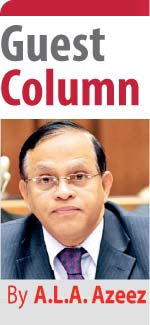Wednesday Feb 18, 2026
Wednesday Feb 18, 2026
Thursday, 1 August 2024 01:10 - - {{hitsCtrl.values.hits}}
 The recent Supreme Court interim ruling has two components. On the first, that is restraining Deshabandu from “the powers, functions and responsibilities” of the office of IGP, the interim order is broad and straightforward.
The recent Supreme Court interim ruling has two components. On the first, that is restraining Deshabandu from “the powers, functions and responsibilities” of the office of IGP, the interim order is broad and straightforward.
The second pertains to the appointment of a suitable officer to act in the office of IGP. The SC ruling states: “...His Excellency the President may, should he wish to, consider making appointment, in terms of the law, of a suitable person to act in the post of IGP for the duration of the afore-stated interim order.”
Strictly speaking, this is only a direction given to the President, respecting the legal provisions under which he has the power to make acting appointment. In effect, it suggests to him that he may, if he wants to, consider making an acting appointment, in terms of the law.
It has been made clear that the President is in no mood to consider this direction of the Supreme Court, to go by the special statement made by the PM in Parliament today.
Nevertheless, there can be no excuse whatsoever on the part of Government to assert that Deshabandu T continues in the post of IGP. That would amount to the violation of the court order and both the person who was the subject of the interim order and anyone who aids and abets that person would risk facing contempt of court charges. However, the argument is that statements made in Parliament are subject to Parliamentary privileges and that no court or tribunal could question the exercise of privileges.
Up to now, Government leaders are speaking on this issue within Parliament only. So it appears that these are privileged statements. Nevertheless, Deshabandu has no privileges and immunities to benefit from. If he purports to perform the duties of the office of the IGP and then denies having done so in an attempt to avoid punishment, statements that are being made within Parliament, though privileged, can be used to corroborate the assertion that he has indeed done it intentionally.
Maybe the officer concerned is power-hungry and may not realise the legal consequences if he is really clinging on to the job. But any violation of a judicial order would no doubt attract the punishment it deserves at some point in the future.